- Home
- Carolyn Keene
Action! Page 6
Action! Read online
Page 6
I nodded. “Yeah. But Luther says that her diary hints at her knowing something. She tore out the pages about the actual heist and what happened to her brothers afterward.”
“Right,” Bess said. “So why does Luther think she knew what they were planning beforehand?”
“When he read over the diary again for this production, he found a passage that he hadn’t paid much attention to before,” I explained. “Two days before the heist, Esther wrote that she had a fight with her brothers. All she said was that she wanted them to ‘reconsider.’ They wouldn’t, and all three of them had a fight. Then the next day’s entry is torn out.”
Bess nudged my arm. “Sounds mysterious,” she said with a grin.
“I guess,” I said. “But I’m almost too busy trying to calm my nerves to get interested in a hundred-year-old mystery!”
Bess just laughed. “Yeah, right! Well, I bet your nerves will calm down as soon as you step in front of the camera again,” she told me. “You’re a natural!”
I sighed. My friends just didn’t seem to understand how much this stage fright was bothering me. But I really wanted to talk to them about it.
In the afternoon I returned to the makeup trailer, where Pam and Degas made me into a younger version of Esther. Then we all went over to the Rackhams’ cabin set. I could see that Mary had done some work there to make the place look slightly different than it had before. The fabric on the couch was newer and cleaner, and there weren’t as many props cluttering the set.
“I’m going to re-dress the set after every scene,” Mary explained to me. “We’re just going to craft little differences, so that audiences will think it’s a different day in each scene.”
“And you’ll be sitting in different places in the cabin for each scene,” Morris chimed in. “One time you’ll sit at the table to write in the diary. Another time you’ll be on the couch, or in the rocking chair.”
“It’s hard to believe that it will look as if each scene is a different time,” I said. “When I know all along that they were shot within an hour of one another.”
“Okay, we’re ready,” Mary said. “The cabin set should look newer, as if Esther and her brothers hadn’t been living there for long. There isn’t as much furniture and there aren’t as many decorations on the walls.”
I nodded. “It definitely looks newer.”
“And you look younger,” Pam said with a proud smile. She powdered my face one last time, and then I took my place at the wooden table.
My pulse pounded in my veins as I waited for the shoot to start. I felt out of place. What was I doing, acting in a movie? I wasn’t an actor—I was a detective! Solving mysteries, I could do. Helping people I could do too. But acting well? Or calming my own jitters? Not at all!
Mary’s assistant handed me a leatherbound book. Inside were blank pages made of old-fashioned pressed paper. It was one of the three duplicates of Esther’s diary that the props department had made.
“Here we go, Nancy,” Morris said. “You’re going to write in the front section of the book. Remember, you’re only fourteen years old now. You’re new in the area, and your brothers are still trying to make a go at being farmers.”
I nodded. It seemed strange that he wanted me to think of all that stuff when the only thing I had to do was write in the diary.
“Action,” Morris said.
I opened the little book, took up the heavy fountain pen, and paused. What was I supposed to write? Suddenly I panicked. Had Morris wanted me to memorize Esther’s actual diary entries? Was the camera going to show what I was writing? I had no idea what kinds of things Esther had written when she was younger. The only thing they’d taught us in school about her diary was that those incriminating pages were ripped out.
“Cut,” Morris said. “Nancy? Why aren’t you writing?”
“Um, I’m not sure what to write,” I admitted. “Did you want me to memorize the actual diary?”
He chuckled. “Good heavens, no. I wouldn’t expect anyone to do that! Just write whatever you want to.”
“The camera won’t see it?”
Morris shook his head. “We’re not going to do close-ups yet. Later we may shoot a few takes of the entries from the real diary. I haven’t decided yet.”
“Okay. Sorry.” I leaned back over the book as a production assistant read off the information about the scene and the take.
“Action,” Morris called.
I touched the fountain pen to the page, and the black ink sank right into the paper, making a big blot. I tried to pretend I hadn’t noticed. I began moving the pen, but I still didn’t know what to write. In desperation I wrote down my address. Then I wrote Bess’s, and then George’s. The whole time all I could think about was the camera. There were at least fifteen people on the soundstage, and they were all staring right at me. The camera was watching me and only me.
I wrote down Jeffrey Allman’s address. I hadn’t even realized I was thinking about him, but I guess the mysterious fire at his house was still in the back of my mind. Maybe I could make a list of possible motives for someone setting the fire. But I felt kind of silly writing something like that in Esther’s diary.
It was really quiet. The silence made me even more nervous for some reason. All I could hear was the sound of the pen scratching as I wrote. My breath began to come faster. I missed having the Alvarez brothers here to distract me. I noticed that my hand was shaking, and the fountain pen made another big blot.
“And … cut,” Morris said.
I put down the pen and turned nervously to the director. “That was good, Nancy,” he said unconvincingly. “But in this next take I want you to remember what we talked about. You’re only fourteen, and you have no worries yet about your brothers.”
“Okay,” I said. But I still didn’t understand why any of that mattered. We did another take. I could tell right away that this one was worse than the last one. With the camera rolling, I became completely selfconscious. I knew that my hands were moving in a weird, stilted way. I wondered if I was sitting up straight or if I would look slumped over on camera. I concentrated on straightening my spine.
Morris called cut again. He got out of his chair and came over to sit with me at the table. I winced, expecting him to yell at me for being such a bad actress.
“You need to relax, Nancy,” he said gently. “You’re very stiff. What’s the matter?”
“I feel silly just sitting here and writing,” I admitted.
Morris smiled. “Maybe that’s the problem. You should be doing more than just sitting and writing.”
Shoot. I was supposed to be doing something else? Had I forgotten some of his directions? My cheeks grew hot with embarrassment. “What else should I be doing?” I asked.
“Thinking,” he said. “You don’t suppose that Esther Rackham felt silly sitting at her table and putting her thoughts down in her diary, do you?”
“Of course not,” I said.
“So why should you feel silly?”
I thought about that. “Well, nobody was watching Esther,” I pointed out. “She didn’t have a camera pointed at her.”
“But if you want to act like Esther, you have to think like Esther,” Morris told me. “You might know you’re being filmed, but Esther doesn’t. She’s just writing in her diary.”
“I guess,” I said. “But I’m not Esther. How am I supposed to forget the camera?”
“By thinking,” he said again. “Right now, you’re thinking your own thoughts—about how you feel silly, about what you should write, about what position you’re sitting in. Am I right?”
I nodded. “I’m self-conscious.”
“Exactly,” Morris said. “So instead of thinking your own thoughts, try to think Esther’s thoughts. She’s not aware of what position she’s sitting in. She’s not wondering what words to write. She’s just thinking her thoughts and putting them down on paper.”
“That’s why you’re telling me to remember how old she is and wh
at her current family situation is?” I asked. “So that I’ll be able to figure out what she’d be thinking?”
“It will give you a starting point,” he said.
I was beginning to understand what he meant. That morning I had concentrated on the other actors. By paying attention to them, I forgot to pay attention to myself and my own thoughts. Now Morris was saying that I should pay attention to Esther’s thoughts the same way I’d done with the Alvarez brothers.
“I’ll do my best,” I promised Morris.
When we did the next take, I tried to ignore the camera. Instead I thought about fourteen-year-old Esther. She was a pioneer girl whose parents had both died when she was a toddler. As far as I could remember, she had been raised by her two older brothers. It’s odd that she didn’t learn bad behavior from them, I thought suddenly. The Rackham boys were notorious criminals, but Esther had been a good girl who saved the life of the man her brothers had tried to kill. Where had she learned her morals? Clearly not from her wild brothers.
“Cut!” Morris’s voice broke into my thoughts. I jumped, startled. A glance at the diary showed me that I’d been writing down what I was thinking about Esther. Somehow I had managed to forget my nervousness for a moment. I’d even forgotten the camera.
“Much better,” Morris said happily. “Let’s do it again.”
My heart sank. Forgetting the camera for one take had been hard enough. How could I do it for another take? Not to mention for all the other scenes I still had to film this afternoon. I had a feeling I was in for a very long day.
Almost nine hours later, I stumbled out of my trailer, exhausted. All afternoon we had filmed Esther writing in her diary. Between every scene, I’d had to wait while Pam and Degas changed my hair and makeup to make me look a little bit older each time. Mary had to change the set, too, to make it look a little more shabby and lived-in as I grew “older.” Plus, the lighting crew had to change the position of their lamps, and Morris had to decide where he wanted me sitting in each scene. But those things were all easy compared to the acting I had to do.
Sitting still and writing didn’t get any more comfortable, no matter how many times I had to do it. There was something so intimate about writing in a diary—it was almost impossible to do it naturally with a camera watching. I used Morris’s trick as much as I could. I thought about how Esther would feel at the age of fourteen, at the age of sixteen, after she’d gotten a job as a bank teller, while she was sick with influenza, and finally when she realized that her brothers were planning a crime. In each different scene, I thought about what was going on in Esther’s life at the time. Sometimes it worked, and sometimes it didn’t. All I knew for sure was that it had taken a long, long time to film.
By the time I had changed back into my own clothes and gotten my stuff from the trailer, it was almost eleven o’clock at night. There was a note on the mirror in my trailer that said there were changes to the script for tomorrow. That meant I had to go and pick up the revised script pages tonight so that I could learn the new lines in time for the next day’s shoot. Yawning, I headed over to the main office. The office was in a temporary building near the parking area.
I was surprised to find George still there. She was sitting at one of the desks in the back with an intricate array of computer cables in front of her.
“Hi,” I greeted her. “I’m glad you’re still here. I’m supposed to pick up pages for tomorrow’s scenes, but the script coordinator is gone.”
“Hang on a sec,” George said, not looking at me. Her fingers were flying over the keyboard on the desk. I glanced around at the mess of wires and motherboards.
I yawned. I felt exhausted and worn out by the long, difficult day. It was hard to believe that I had to come back tomorrow to shoot even more scenes. After the mess I had made of the diary scenes, I was surprised Morris hadn’t fired me on the spot.
“George, can you just print out the new pages for me?” I asked. “I had a really hard—”
“This is Jeffrey Allman’s computer,” George interrupted me. “I’ve managed to recover a few files.”
“What do you mean?” I asked. “Where’s his computer?”
George indicated a pile of boards and chips that looked like an electronic skeleton. “That’s his hard drive,” she said. “I took it out of the laptop casing, because the casing was so damaged by the fire.”
“Uh-huh,” I said, yawning again. I really needed to get home and go to sleep. I’d have to wake up very early to learn the new lines for tomorrow. Just thinking about it made me feel nervous all over again.
“I hooked up his hard drive to the computer here, and I think I’m making real progress,” George began. The sparkle in her eyes told me that she was about to launch into a long and detailed account of how she had managed to recover the damaged files. And suddenly I knew that I couldn’t take it. I was so overwhelmed by my feelings of stage fright and failure and exhaustion that I couldn’t stand still and listen to George talking about computers.
“I need the revised pages,” I said.
“Nance, you don’t understand—”
“No, you don’t understand,” I snapped. “I’m tired and I’m having a really hard time on this movie, but you and Bess don’t seem to get it. Every time I say I’m nervous, you act like it’s a joke. But it’s not. I don’t care about your computers any more than you care about my stage fright. Now can you just print out the pages so I can go home?”
George stared at me, her brown eyes wide and astonished. I felt a stab of guilt. I’d never spoken to her like that before. But I was too tired to do anything about it now.
Silently George turned to the computer and pulled up the script. She hit Print, and the pages shot quickly from the printer near the door. George didn’t even turn back to look at me again. I took the pages from the printer and left without saying good-bye.
The Mountain Lion Attack
I woke up late the next morning, as usual. The first thing I thought about was how I had snapped at George. I glanced at the clock. It was almost eight thirty. George is an early bird. She was probably at the set already. I didn’t want to bother her at work, so I would have to call her later.
Thinking about George reminded me of the fire at Jeffrey Allman’s house. George had mentioned that she was making progress in salvaging his hard drive. I wished again that I hadn’t cut her off—she’d probably been trying to tell me something important about the mystery of who set the fire. Would Mr. Allman’s laptop help us find the answer? It was possible that his old computer files from Rackham Industries would contain information leading to a suspect.
I wished I could have focused on a nice, juicy mystery like that one. It would have been much easier than trying to figure out why I was so nervous all the time on the set!
I sighed and picked up the revised script pages I’d gotten last night. I only had one scene today, in the late afternoon. But the whole thing had changed a lot since the last time I saw it. Luther and Althea seemed to keep making my part bigger every time they did a rewrite. The original scene had contained only two lines of dialogue for Esther. The revised scene had two whole pages of new dialogue for me to memorize!
There was a knock on my door, and Hannah stuck her head in.
“Morning, Hannah,” I said.
She stepped inside and frowned at me, her hands on her hips.
“Uh-oh,” I said. “What did I do wrong?”
“You ate the dinner I left you last night,” Hannah said.
I nodded. She had left a whole plate of her meat-loaf and vegetables wrapped up in the fridge. I’d been so hungry by the time I got home that I stuck it in the microwave and gobbled the entire thing. “It was delicious,” I told her. “Thanks.”
“You left your dirty plate sitting out on the table,” Hannah said. “With the dirty tin foil lying next to it, and the dirty utensils on the table too.”
I grimaced. How could I have forgotten to clean up after myself? Hannah hates anythi
ng dirty on the clean table. “Yikes!” I cried. “I’m sorry, Hannah. I got home so late, and it was such a bad day …”
Immediately Hannah’s frown disappeared. She studied my face for a moment, then took a seat on the foot of the bed.
“Why was it a bad day?” she asked.
“I kind of messed up a lot during filming,” I admitted.
“Did you forget your lines?”
“No.” I shrugged helplessly. “I didn’t even have any lines. I was just sitting there writing in a diary.”
“So how did you mess up?” Hannah asked. “You never ‘mess up’ anything!”
“Oh, come on, Hannah. I got nervous, so I didn’t look natural,” I told her. “The director helped me out a lot. In fact, if he hadn’t taught me a trick about how to do it, I wouldn’t have gotten through a single take.”
“But you still think you did a bad job?” Hannah asked. “Even after he taught you his trick?”
I nodded. “I could tell he was frustrated with me by the end of the day. They were just short scenes with no dialogue. It shouldn’t have taken so long to shoot them all. But I had to keep doing a lot of takes.”
“Why?”
“I got self-conscious in front of the camera,” I said quietly. “In fact, I always get self-conscious these days.”
Hannah’s brow wrinkled in concern. “That doesn’t sound like you,” she said. “You’re the most confident girl I know.”
“Not when it comes to acting,” I murmured.
“What do your friends say?” Hannah asked.
“Every time I try to tell anyone that I’m nervous, they say it’s normal,” I told her. “But I don’t think it is normal. This is more than just jitters. I’m really afraid I’m going to make a fool of myself.”
“But Bess and George said that everyone on set considers you a natural,” Hannah protested.
I shrugged. “I doubt Morris thinks I’m a natural after yesterday. Mostly I’ve just managed to muddle through.”
Hannah looked skeptical. “I have a feeling that you’re doing a much better job than you think you are,” she said.

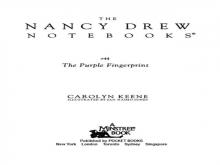 The Purple Fingerprint
The Purple Fingerprint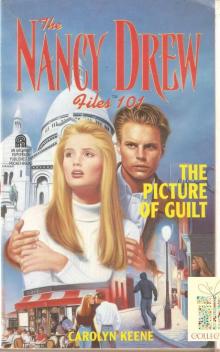 The Picture of Guilt
The Picture of Guilt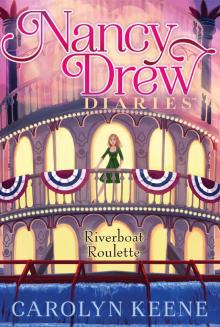 Riverboat Roulette
Riverboat Roulette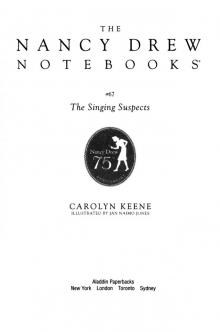 The Singing Suspects
The Singing Suspects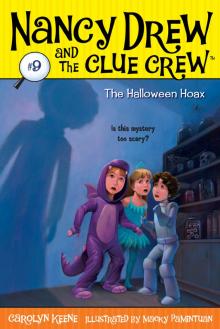 The Halloween Hoax
The Halloween Hoax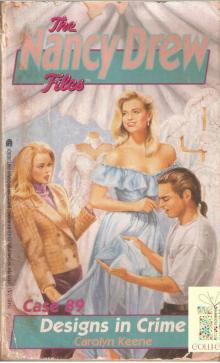 089 Designs in Crime
089 Designs in Crime The Hidden Treasures
The Hidden Treasures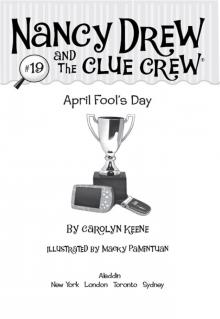 April Fool's Day
April Fool's Day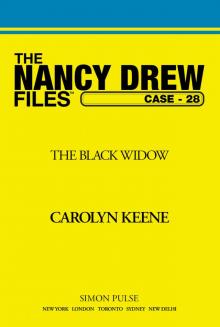 The Black Widow
The Black Widow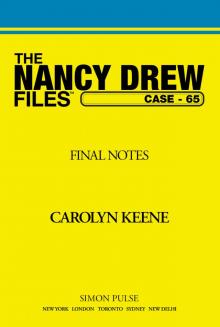 Final Notes
Final Notes The Haunting on Heliotrope Lane
The Haunting on Heliotrope Lane The Runaway Bride
The Runaway Bride The Ghost of Grey Fox Inn
The Ghost of Grey Fox Inn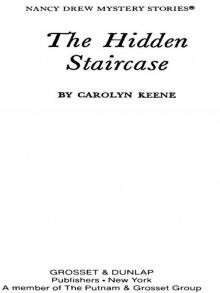 The Hidden Staircase
The Hidden Staircase Mystery of the Winged Lion
Mystery of the Winged Lion Over the Edge
Over the Edge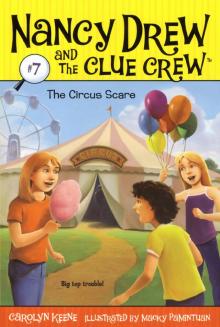 The Circus Scare
The Circus Scare The Mystery of the Brass-Bound Trunk
The Mystery of the Brass-Bound Trunk Ski School Sneak
Ski School Sneak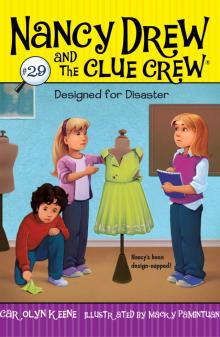 Designed for Disaster
Designed for Disaster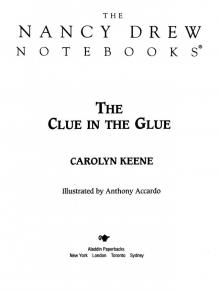 The Clue in the Glue
The Clue in the Glue Cold as Ice
Cold as Ice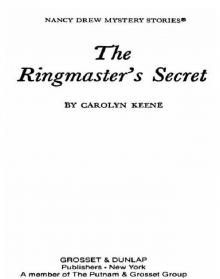 The Ringmaster's Secret
The Ringmaster's Secret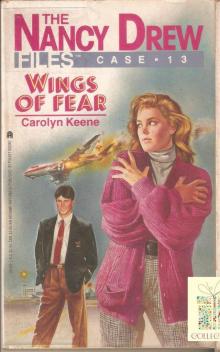 013 Wings of Fear
013 Wings of Fear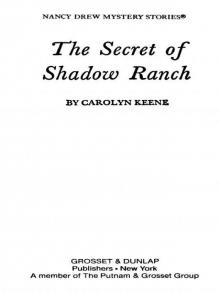 The Secret of Shadow Ranch
The Secret of Shadow Ranch Not Nice on Ice
Not Nice on Ice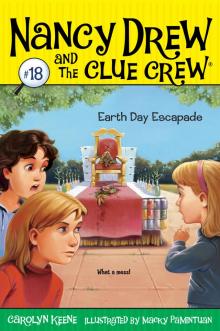 Earth Day Escapade
Earth Day Escapade Mystery of Crocodile Island
Mystery of Crocodile Island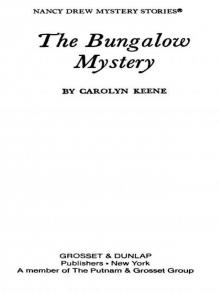 The Bungalow Mystery
The Bungalow Mystery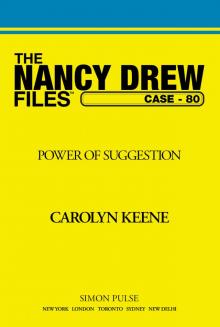 Power of Suggestion
Power of Suggestion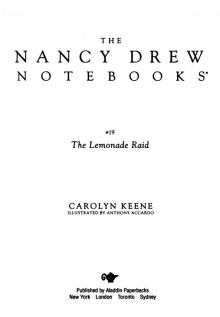 The Lemonade Raid
The Lemonade Raid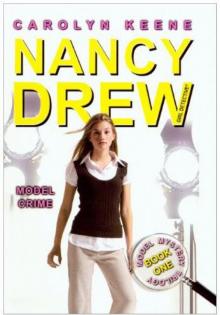 Model Crime
Model Crime The Lucky Horseshoes
The Lucky Horseshoes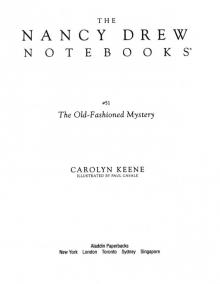 The Secret of the Old Clock
The Secret of the Old Clock The Clue at Black Creek Farm
The Clue at Black Creek Farm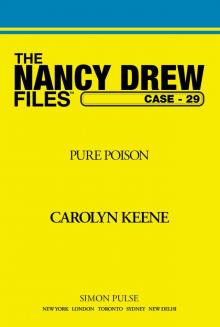 Pure Poison
Pure Poison Nobody's Business
Nobody's Business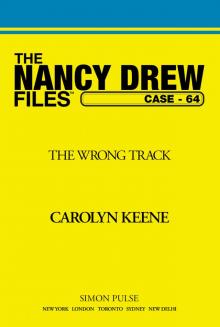 Wrong Track
Wrong Track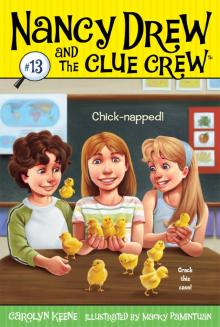 Chick-Napped!
Chick-Napped!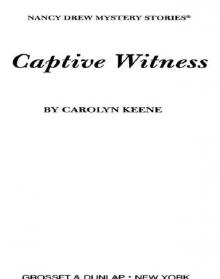 Captive Witness
Captive Witness If Looks Could Kill
If Looks Could Kill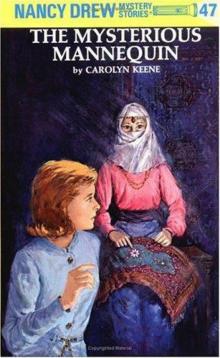 The Mysterious Mannequin
The Mysterious Mannequin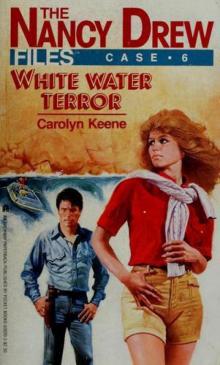 White Water Terror
White Water Terror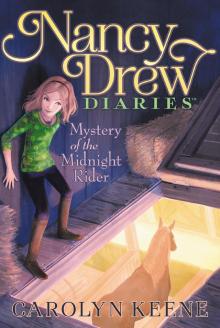 Mystery of the Midnight Rider
Mystery of the Midnight Rider Space Case
Space Case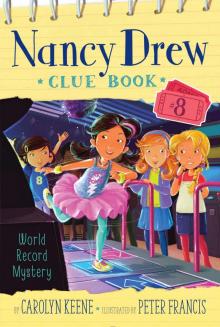 World Record Mystery
World Record Mystery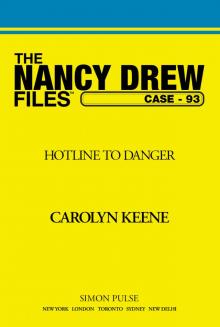 Hotline to Danger
Hotline to Danger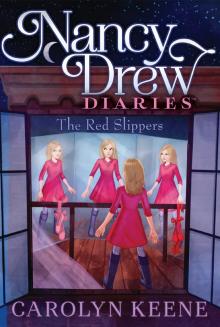 The Red Slippers
The Red Slippers A Crime for Christmas
A Crime for Christmas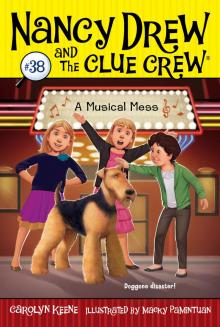 A Musical Mess
A Musical Mess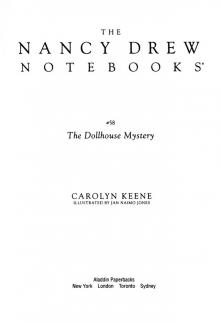 The Dollhouse Mystery
The Dollhouse Mystery Portrait in Crime
Portrait in Crime The Message in the Haunted Mansion
The Message in the Haunted Mansion Playing With Fire
Playing With Fire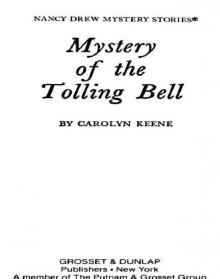 Mystery of the Tolling Bell
Mystery of the Tolling Bell Cutting Edge
Cutting Edge The Gumdrop Ghost
The Gumdrop Ghost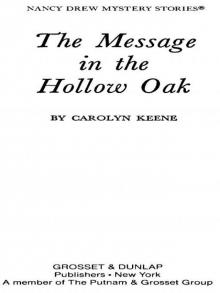 The Message in the Hollow Oak
The Message in the Hollow Oak Trial by Fire
Trial by Fire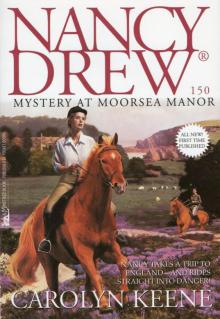 Mystery at Moorsea Manor
Mystery at Moorsea Manor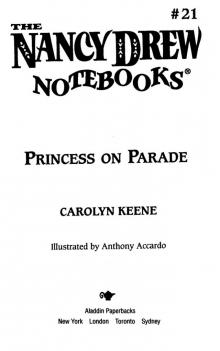 Princess on Parade
Princess on Parade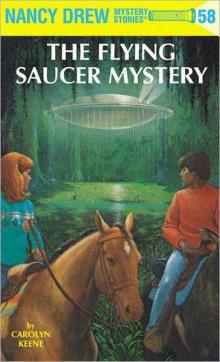 The Flying Saucer Mystery
The Flying Saucer Mystery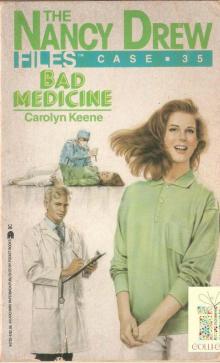 035 Bad Medicine
035 Bad Medicine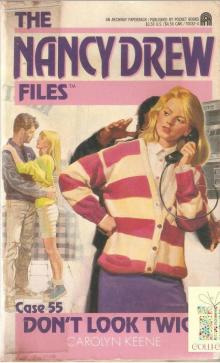 055 Don't Look Twice
055 Don't Look Twice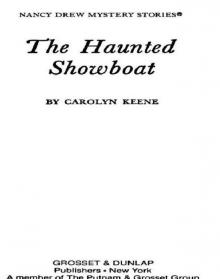 The Haunted Showboat
The Haunted Showboat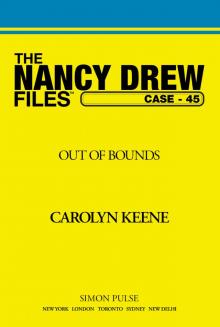 Out of Bounds
Out of Bounds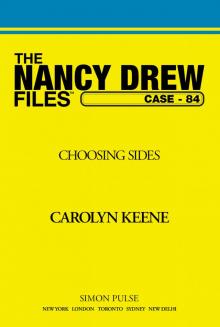 Choosing Sides
Choosing Sides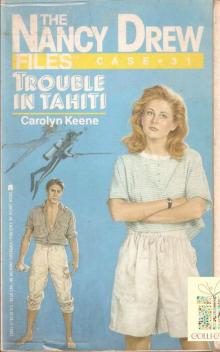 031 Trouble in Tahiti
031 Trouble in Tahiti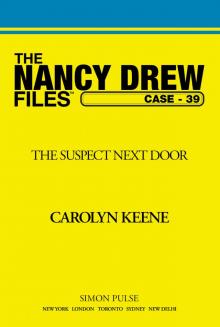 The Suspect Next Door
The Suspect Next Door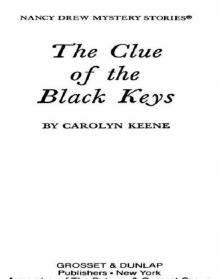 The Clue of the Black Keys
The Clue of the Black Keys The Secret Santa
The Secret Santa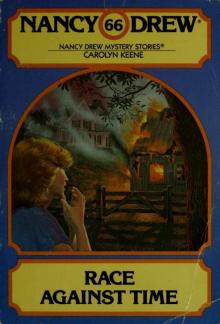 Race Against Time
Race Against Time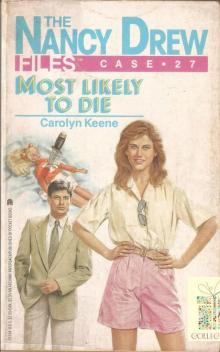 027 Most Likely to Die
027 Most Likely to Die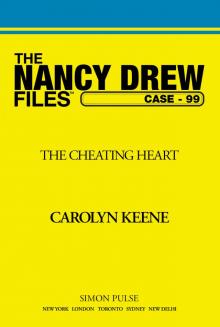 The Cheating Heart
The Cheating Heart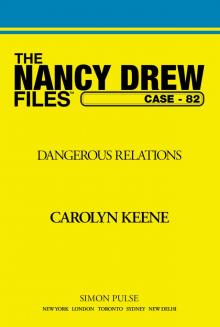 Dangerous Relations
Dangerous Relations It's No Joke!
It's No Joke!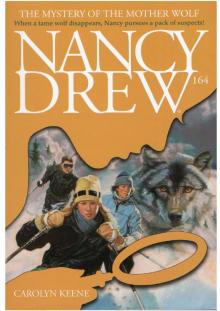 The Mystery of the Mother Wolf
The Mystery of the Mother Wolf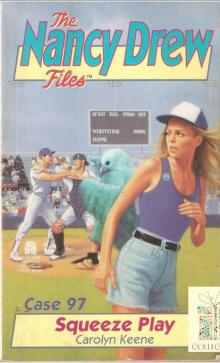 097 Squeeze Play
097 Squeeze Play Secret at Mystic Lake
Secret at Mystic Lake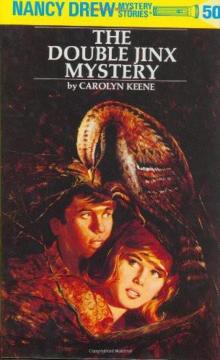 The Double Jinx Mystery
The Double Jinx Mystery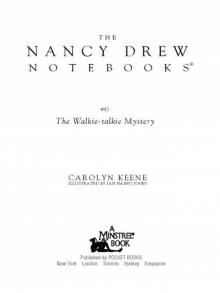 The Walkie Talkie Mystery
The Walkie Talkie Mystery The Case of the Vanishing Veil
The Case of the Vanishing Veil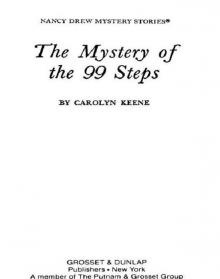 The Mystery of the 99 Steps
The Mystery of the 99 Steps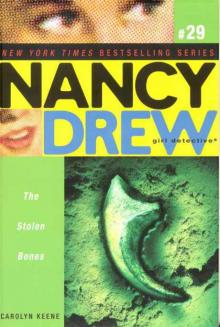 The Stolen Bones
The Stolen Bones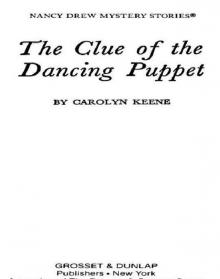 The Clue of the Dancing Puppet
The Clue of the Dancing Puppet The Sand Castle Mystery
The Sand Castle Mystery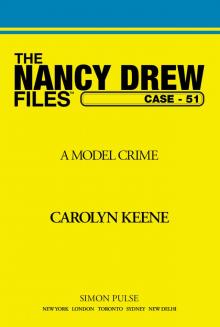 A Model Crime
A Model Crime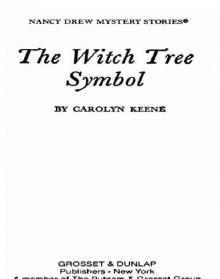 The Witch Tree Symbol
The Witch Tree Symbol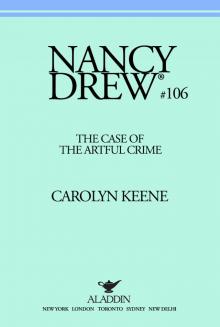 The Case of the Artful Crime
The Case of the Artful Crime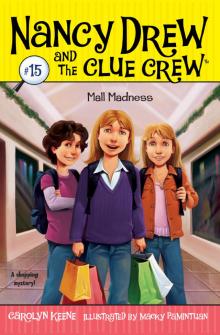 Mall Madness
Mall Madness Swiss Secrets
Swiss Secrets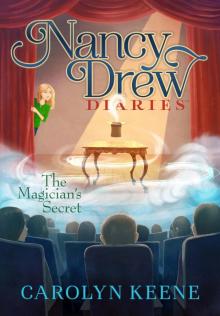 The Magician's Secret
The Magician's Secret Tall, Dark and Deadly
Tall, Dark and Deadly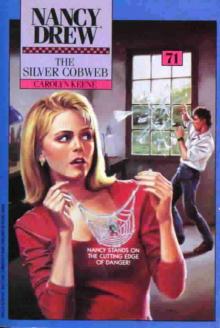 The Silver Cobweb
The Silver Cobweb The Clue of the Gold Doubloons
The Clue of the Gold Doubloons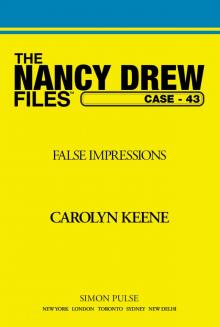 False Impressions
False Impressions Model Suspect
Model Suspect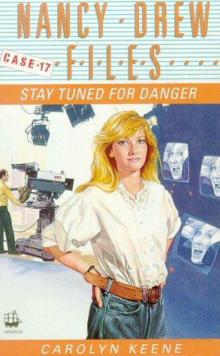 Stay Tuned for Danger
Stay Tuned for Danger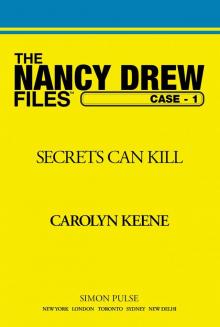 Secrets Can Kill
Secrets Can Kill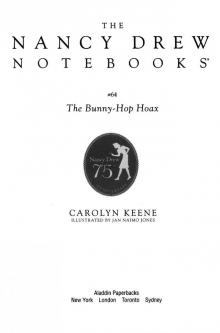 The Bunny-Hop Hoax
The Bunny-Hop Hoax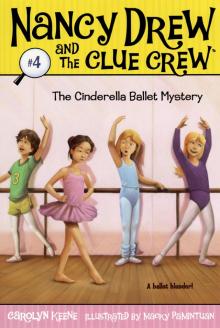 The Cinderella Ballet Mystery
The Cinderella Ballet Mystery The Secret at Solaire
The Secret at Solaire Trash or Treasure?
Trash or Treasure?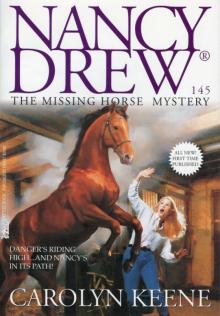 The Missing Horse Mystery
The Missing Horse Mystery The Lost Locket
The Lost Locket The Secret of the Wooden Lady
The Secret of the Wooden Lady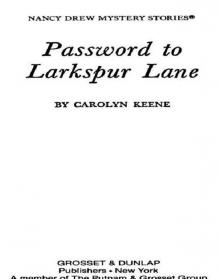 Password to Larkspur Lane
Password to Larkspur Lane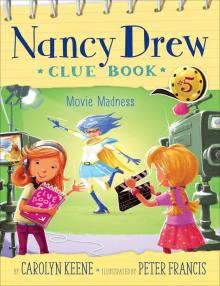 Movie Madness
Movie Madness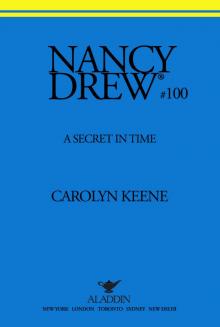 A Secret in Time
A Secret in Time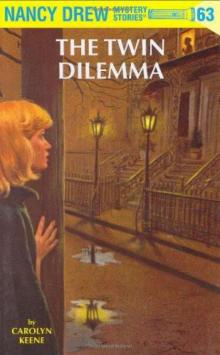 The Twin Dilemma
The Twin Dilemma Candy Is Dandy
Candy Is Dandy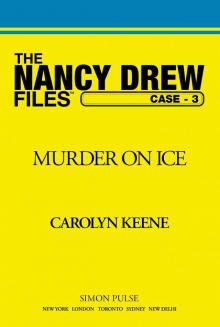 Murder on Ice
Murder on Ice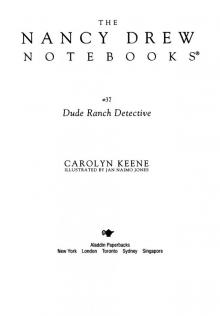 Dude Ranch Detective
Dude Ranch Detective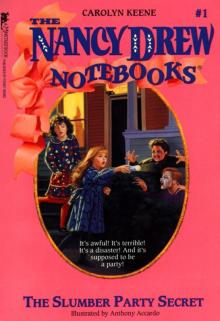 The Slumber Party Secret
The Slumber Party Secret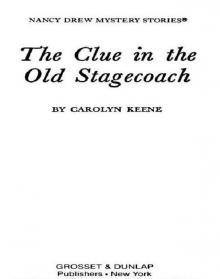 The Clue in the Old Stagecoach
The Clue in the Old Stagecoach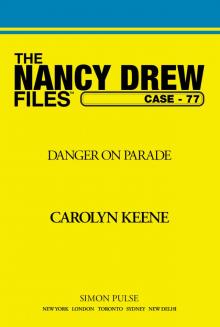 Danger on Parade
Danger on Parade Big Top Flop
Big Top Flop Strangers on a Train
Strangers on a Train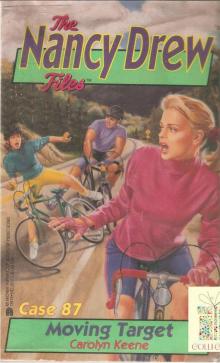 087 Moving Target
087 Moving Target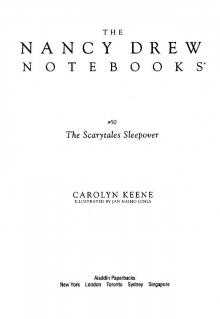 The Scarytales Sleepover
The Scarytales Sleepover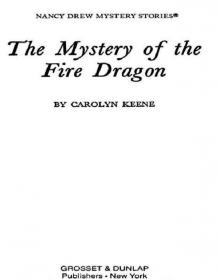 The Mystery of the Fire Dragon
The Mystery of the Fire Dragon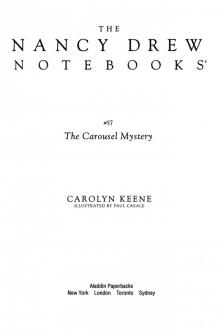 The Carousel Mystery
The Carousel Mystery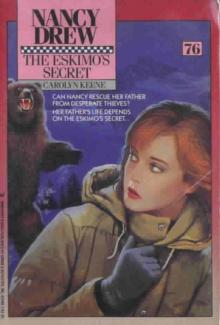 The Eskimo's Secret
The Eskimo's Secret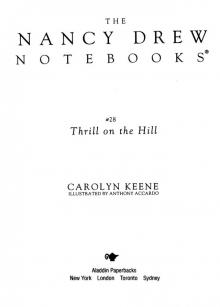 Thrill on the Hill
Thrill on the Hill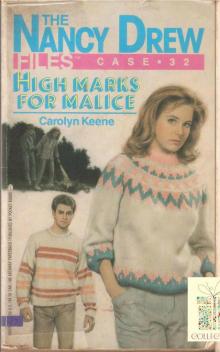 032 High Marks for Malice
032 High Marks for Malice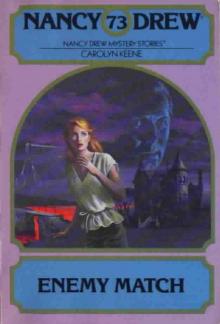 Enemy Match
Enemy Match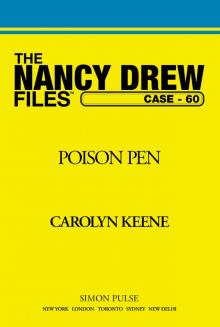 Poison Pen
Poison Pen Lights, Camera . . . Cats!
Lights, Camera . . . Cats! Lost in the Everglades
Lost in the Everglades Strike-Out Scare
Strike-Out Scare Third-Grade Reporter
Third-Grade Reporter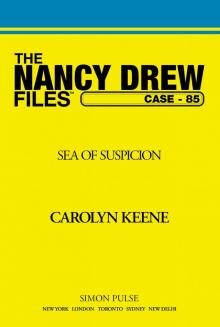 Sea of Suspicion
Sea of Suspicion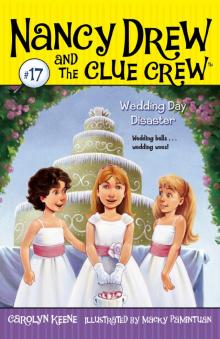 Wedding Day Disaster
Wedding Day Disaster The Make-A-Pet Mystery
The Make-A-Pet Mystery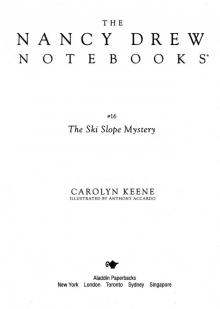 The Ski Slope Mystery
The Ski Slope Mystery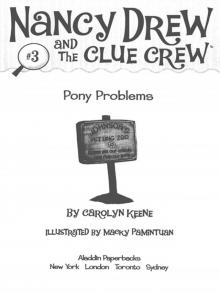 Pony Problems
Pony Problems Candy Kingdom Chaos
Candy Kingdom Chaos The Sign in the Smoke
The Sign in the Smoke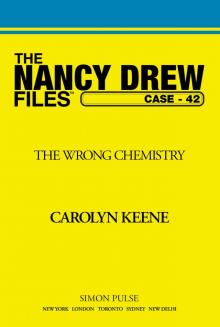 The Wrong Chemistry
The Wrong Chemistry Circus Act
Circus Act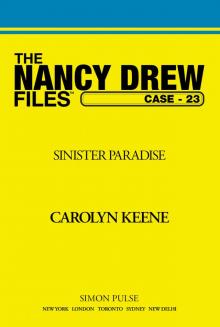 Sinister Paradise
Sinister Paradise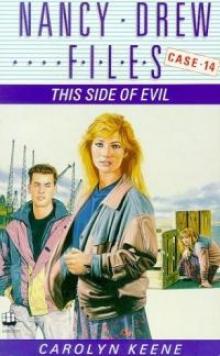 This Side of Evil
This Side of Evil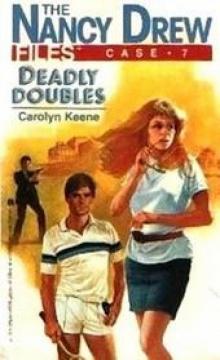 Deadly Doubles
Deadly Doubles The Mystery of the Masked Rider
The Mystery of the Masked Rider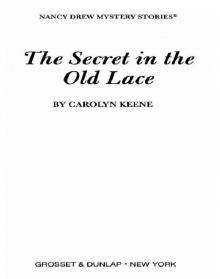 The Secret in the Old Lace
The Secret in the Old Lace The Pen Pal Puzzle
The Pen Pal Puzzle Without a Trace
Without a Trace Whose Pet Is Best?
Whose Pet Is Best?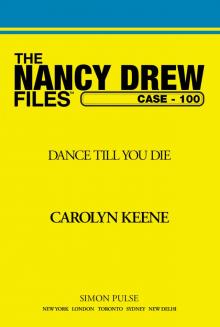 Dance Till You Die
Dance Till You Die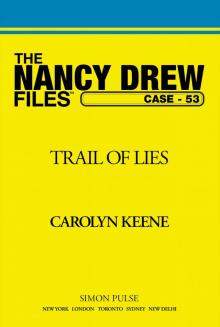 Trail of Lies
Trail of Lies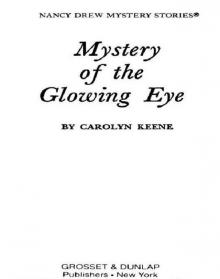 Mystery of the Glowing Eye
Mystery of the Glowing Eye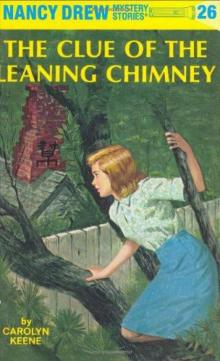 The Clue of the Leaning Chimney
The Clue of the Leaning Chimney The Crook Who Took the Book
The Crook Who Took the Book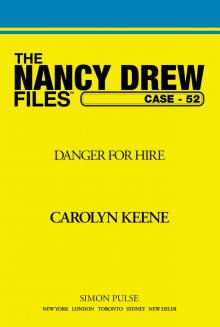 Danger for Hire
Danger for Hire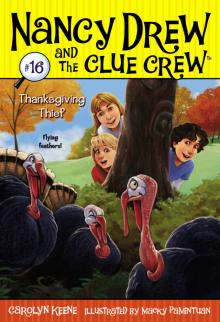 Thanksgiving Thief
Thanksgiving Thief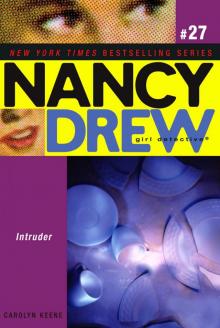 Intruder!
Intruder!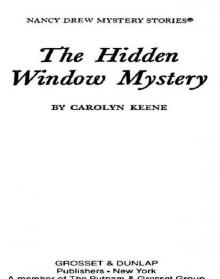 The Hidden Window Mystery
The Hidden Window Mystery Win, Place or Die
Win, Place or Die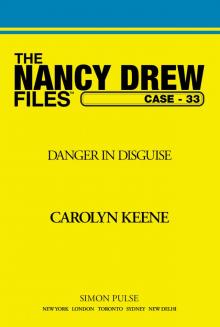 Danger in Disguise
Danger in Disguise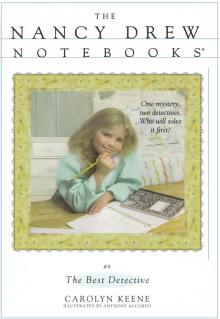 The Best Detective
The Best Detective The Thanksgiving Surprise
The Thanksgiving Surprise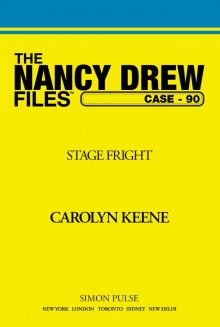 Stage Fright
Stage Fright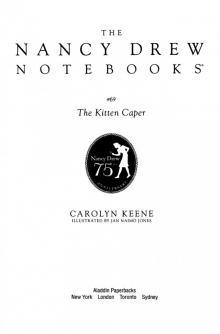 The Kitten Caper
The Kitten Caper Stolen Affections
Stolen Affections The Phantom of Nantucket
The Phantom of Nantucket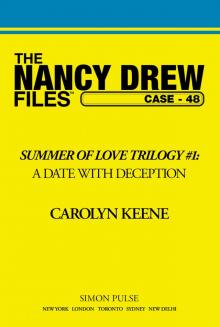 Date With Deception
Date With Deception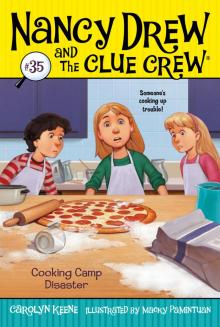 Cooking Camp Disaster
Cooking Camp Disaster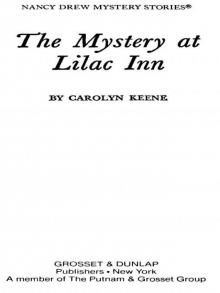 The Mystery at Lilac Inn
The Mystery at Lilac Inn Springtime Crime
Springtime Crime Action!
Action! Into Thin Air
Into Thin Air The Chocolate-Covered Contest
The Chocolate-Covered Contest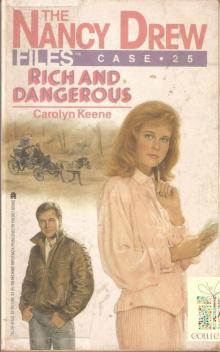 025 Rich and Dangerous
025 Rich and Dangerous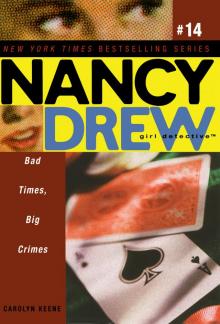 Bad Times, Big Crimes
Bad Times, Big Crimes 078 The Phantom Of Venice
078 The Phantom Of Venice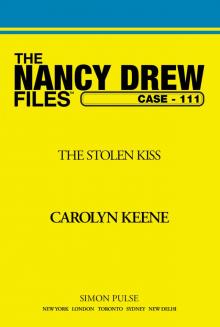 The Stolen Kiss
The Stolen Kiss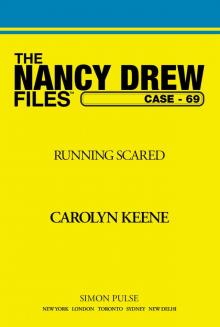 Running Scared
Running Scared The Wedding Gift Goof
The Wedding Gift Goof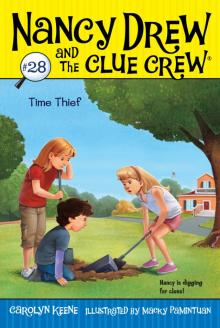 Time Thief
Time Thief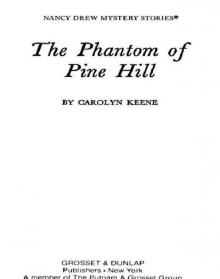 The Phantom of Pine Hill
The Phantom of Pine Hill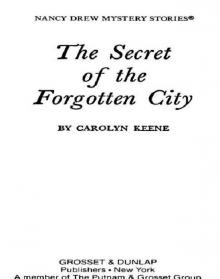 The Secret of the Forgotten City
The Secret of the Forgotten City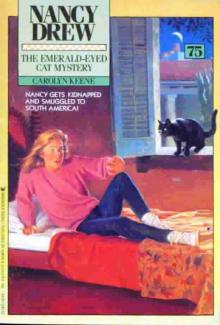 The Emerald-Eyed Cat Mystery
The Emerald-Eyed Cat Mystery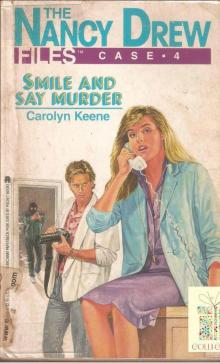 004 Smile and Say Murder
004 Smile and Say Murder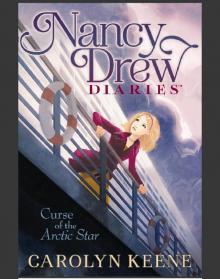 Curse of the Arctic Star
Curse of the Arctic Star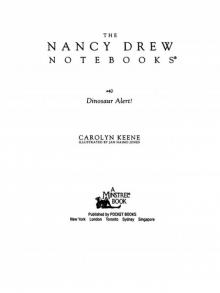 Dinosaur Alert!
Dinosaur Alert!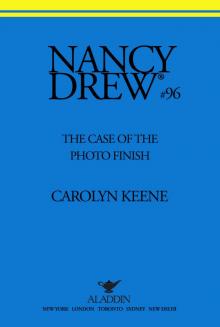 The Case of the Photo Finish
The Case of the Photo Finish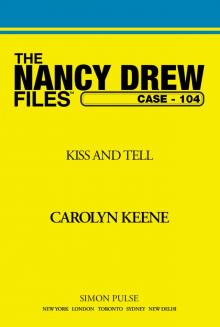 Kiss and Tell
Kiss and Tell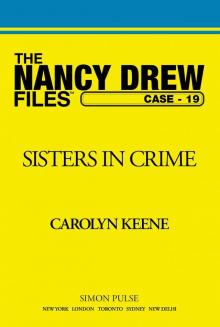 Sisters in Crime
Sisters in Crime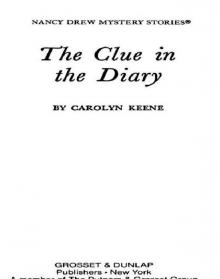 The Clue in the Diary
The Clue in the Diary 084 Choosing Sides
084 Choosing Sides Haunting of Horse Island
Haunting of Horse Island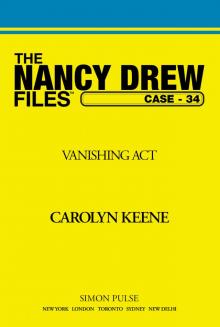 Vanishing Act
Vanishing Act The Big Island Burglary
The Big Island Burglary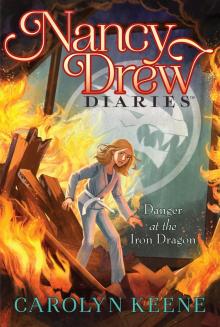 Danger at the Iron Dragon
Danger at the Iron Dragon Pets on Parade
Pets on Parade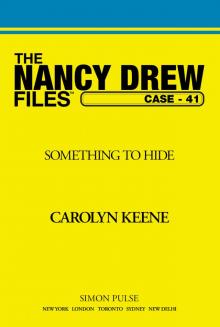 Something to Hide
Something to Hide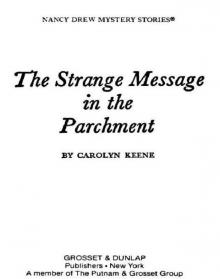 The Strange Message in the Parchment
The Strange Message in the Parchment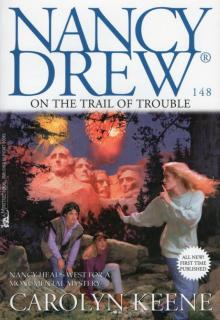 On the Trail of Trouble
On the Trail of Trouble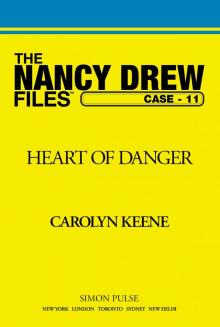 Heart of Danger
Heart of Danger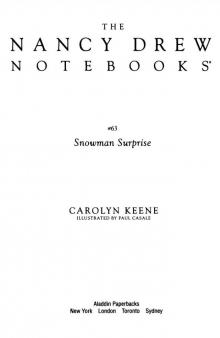 The Snowman Surprise
The Snowman Surprise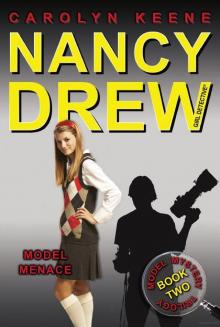 Model Menace
Model Menace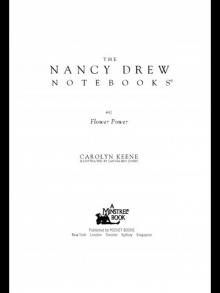 Flower Power
Flower Power The Great Goat Gaffe
The Great Goat Gaffe 081 Making Waves
081 Making Waves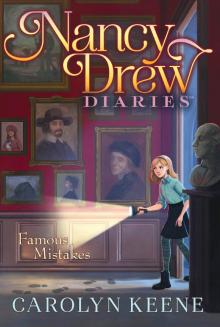 Famous Mistakes
Famous Mistakes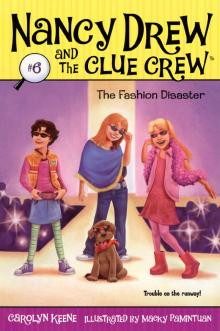 The Fashion Disaster
The Fashion Disaster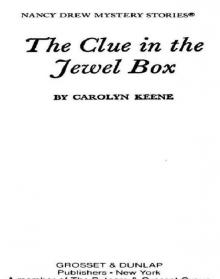 The Clue in the Jewel Box
The Clue in the Jewel Box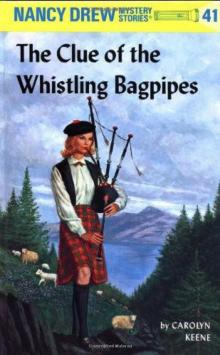 The Clue of the Whistling Bagpipes
The Clue of the Whistling Bagpipes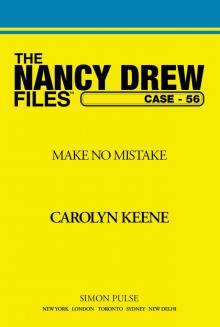 Make No Mistake
Make No Mistake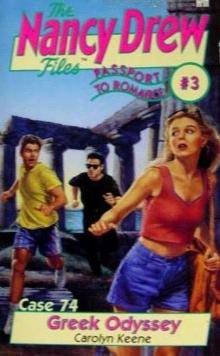 Greek Odyssey
Greek Odyssey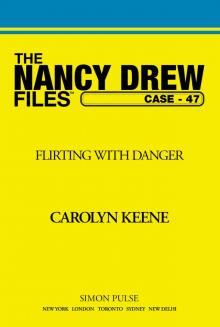 Flirting With Danger
Flirting With Danger Double Take
Double Take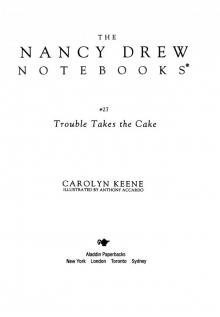 Trouble Takes the Cake
Trouble Takes the Cake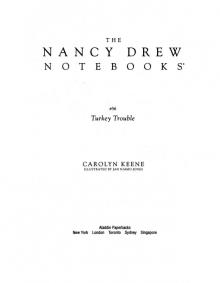 Turkey Trouble
Turkey Trouble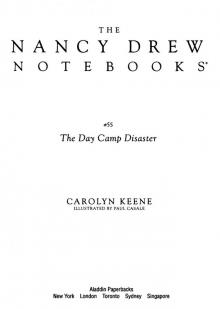 The Day Camp Disaster
The Day Camp Disaster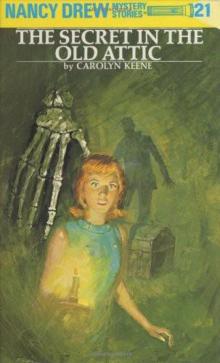 The Secret in the Old Attic
The Secret in the Old Attic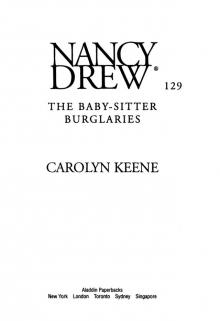 The Baby-Sitter Burglaries
The Baby-Sitter Burglaries Recipe for Murder
Recipe for Murder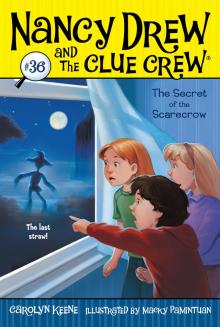 The Secret of the Scarecrow
The Secret of the Scarecrow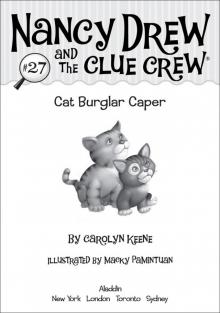 Cat Burglar Caper
Cat Burglar Caper Turkey Trot Plot
Turkey Trot Plot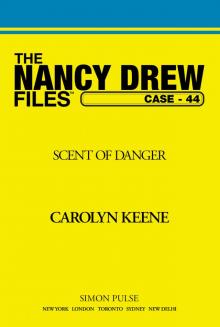 Scent of Danger
Scent of Danger The Clue in the Crossword Cipher
The Clue in the Crossword Cipher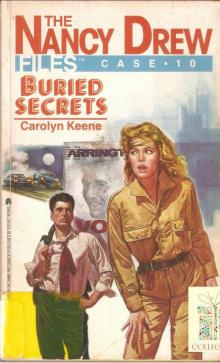 010 Buried Secrets
010 Buried Secrets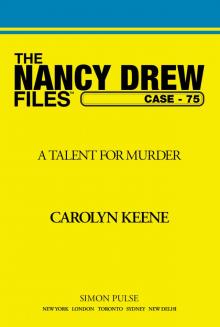 A Talent for Murder
A Talent for Murder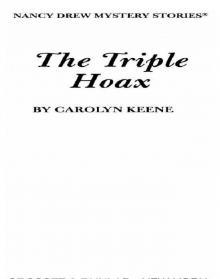 The Triple Hoax
The Triple Hoax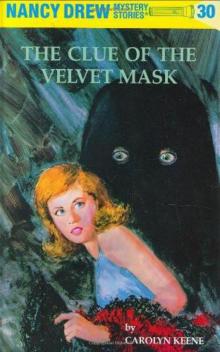 The Clue of the Velvet Mask
The Clue of the Velvet Mask Last Lemonade Standing
Last Lemonade Standing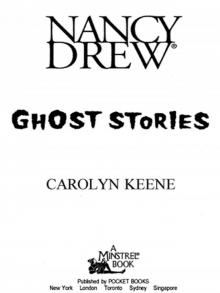 The Ghost of Blackwood Hall
The Ghost of Blackwood Hall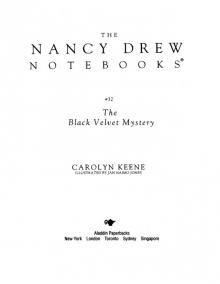 The Black Velvet Mystery
The Black Velvet Mystery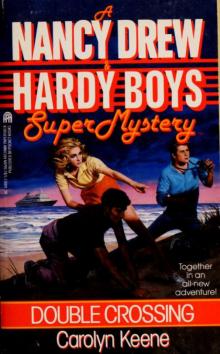 Double Crossing
Double Crossing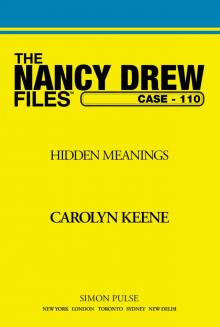 Hidden Meanings
Hidden Meanings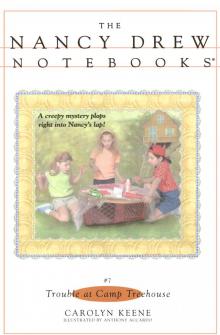 Trouble at Camp Treehouse
Trouble at Camp Treehouse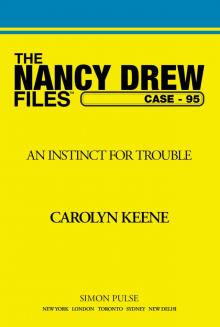 An Instinct for Trouble
An Instinct for Trouble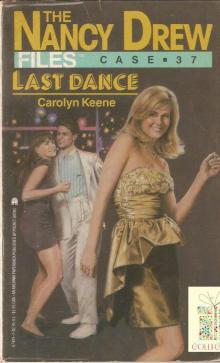 037 Last Dance
037 Last Dance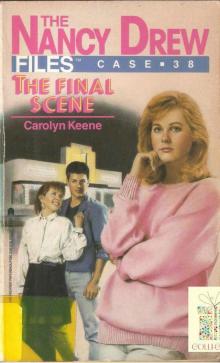 038 The Final Scene
038 The Final Scene Duck Derby Debacle
Duck Derby Debacle The Pumpkin Patch Puzzle
The Pumpkin Patch Puzzle Hidden Pictures
Hidden Pictures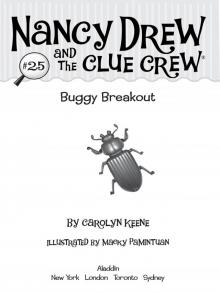 Buggy Breakout
Buggy Breakout California Schemin'
California Schemin'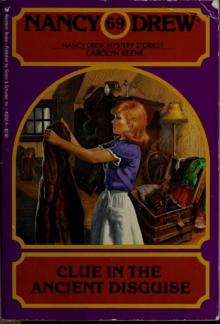 Clue in the Ancient Disguise
Clue in the Ancient Disguise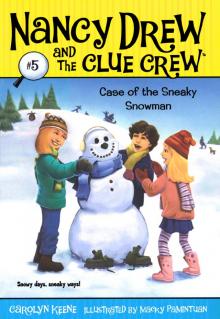 Case of the Sneaky Snowman
Case of the Sneaky Snowman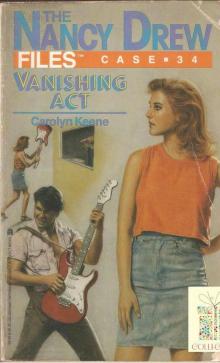 034 Vanishing Act
034 Vanishing Act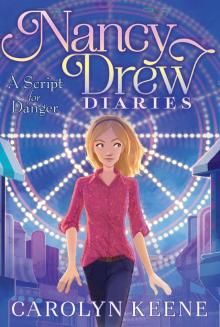 A Script for Danger
A Script for Danger The Flower Show Fiasco
The Flower Show Fiasco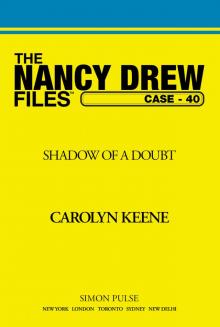 Shadow of a Doubt
Shadow of a Doubt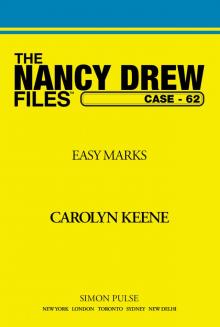 Easy Marks
Easy Marks Alien in the Classroom
Alien in the Classroom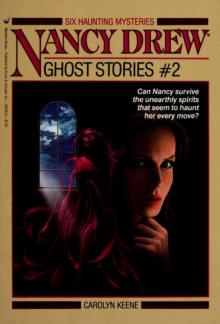 Ghost Stories, #2 (Nancy Drew)
Ghost Stories, #2 (Nancy Drew) The Bike Race Mystery
The Bike Race Mystery False Pretenses
False Pretenses The Kachina Doll Mystery
The Kachina Doll Mystery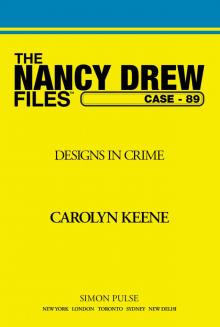 Designs in Crime
Designs in Crime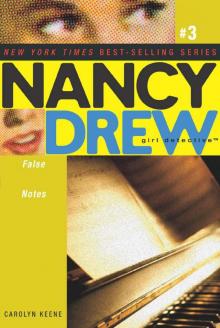 False Notes
False Notes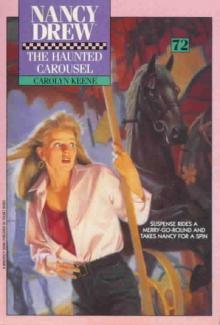 The Haunted Carousel
The Haunted Carousel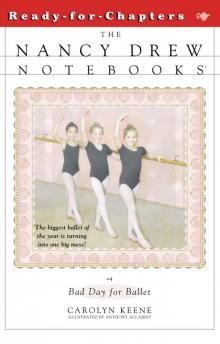 Bad Day for Ballet
Bad Day for Ballet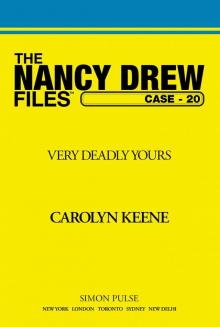 Very Deadly Yours
Very Deadly Yours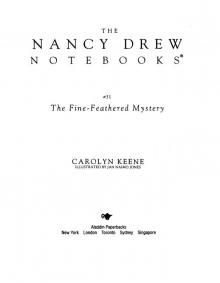 The Fine-Feathered Mystery
The Fine-Feathered Mystery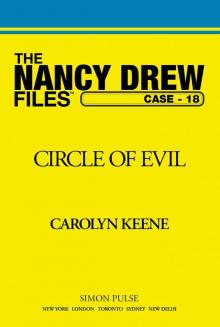 Circle of Evil
Circle of Evil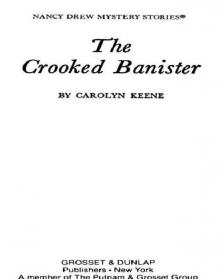 The Crooked Banister
The Crooked Banister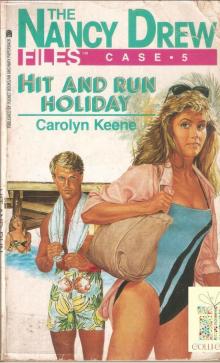 005 Hit and Run Holiday
005 Hit and Run Holiday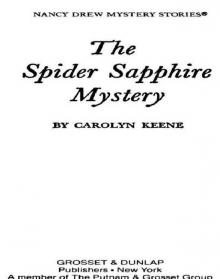 The Spider Sapphire Mystery
The Spider Sapphire Mystery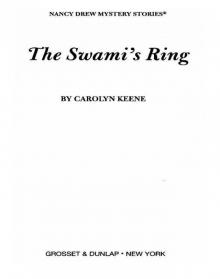 The Swami's Ring
The Swami's Ring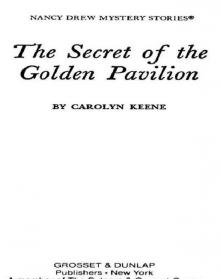 The Secret of the Golden Pavilion
The Secret of the Golden Pavilion Recipe for Trouble
Recipe for Trouble Betrayed by Love
Betrayed by Love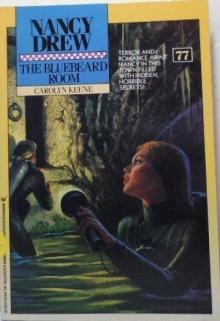 The Bluebeard Room
The Bluebeard Room Sweet Revenge
Sweet Revenge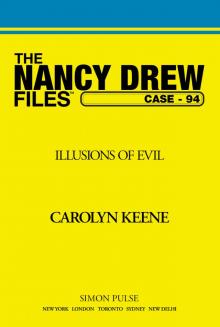 Illusions of Evil
Illusions of Evil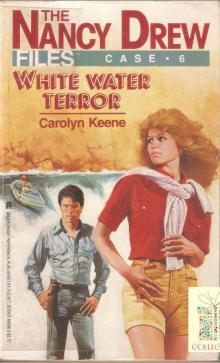 006 White Water Terror
006 White Water Terror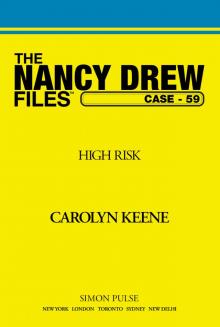 High Risk
High Risk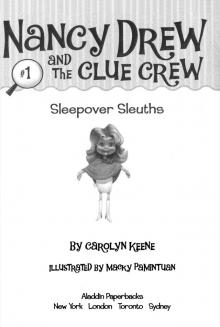 Sleepover Sleuths
Sleepover Sleuths The Clue on the Crystal Dove
The Clue on the Crystal Dove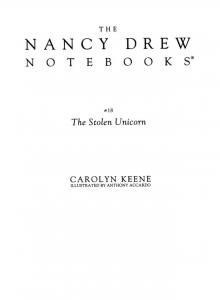 The Stolen Unicorn
The Stolen Unicorn The Professor and the Puzzle
The Professor and the Puzzle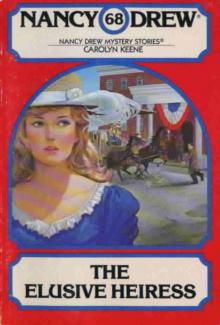 The Elusive Heiress
The Elusive Heiress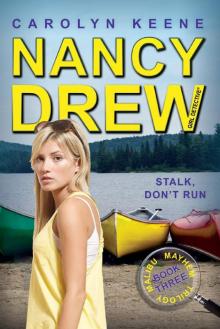 Stalk, Don't Run
Stalk, Don't Run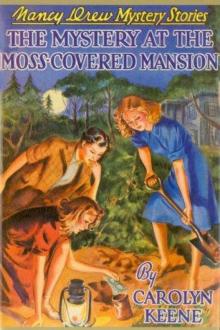 The Mystery at the Moss-Covered Mansion
The Mystery at the Moss-Covered Mansion The Tortoise and the Scare
The Tortoise and the Scare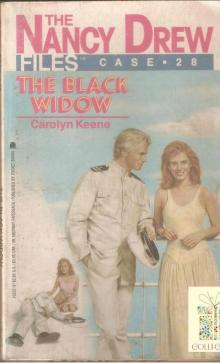 028 The Black Widow
028 The Black Widow Big Worry in Wonderland
Big Worry in Wonderland Crosscurrents
Crosscurrents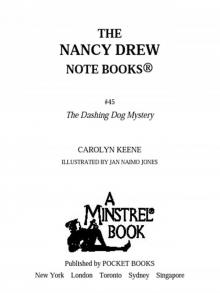 The Dashing Dog Mystery
The Dashing Dog Mystery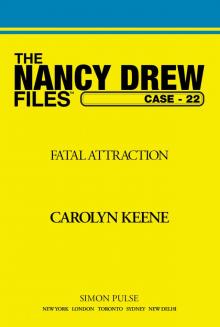 Fatal Attraction
Fatal Attraction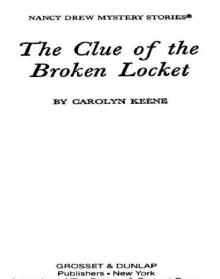 The Clue of the Broken Locket
The Clue of the Broken Locket The Stinky Cheese Surprise
The Stinky Cheese Surprise Mystery of the Ivory Charm
Mystery of the Ivory Charm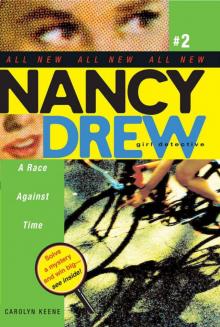 A Race Against Time
A Race Against Time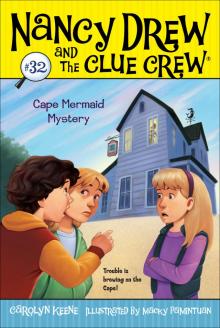 Cape Mermaid Mystery
Cape Mermaid Mystery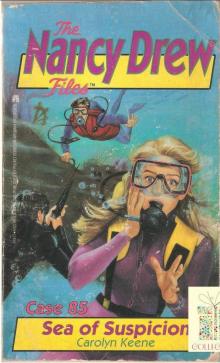 085 Sea of Suspicion
085 Sea of Suspicion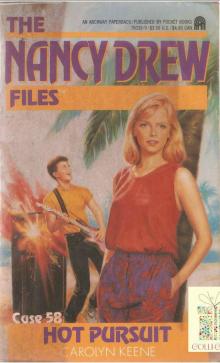 058 Hot Pursuit
058 Hot Pursuit The Secret in the Spooky Woods
The Secret in the Spooky Woods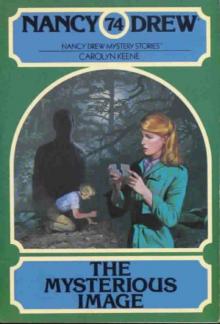 The Mysterious Image
The Mysterious Image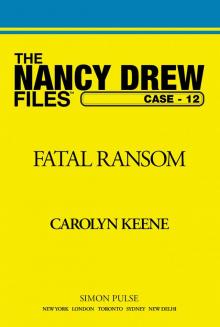 Fatal Ransom
Fatal Ransom The Stolen Show
The Stolen Show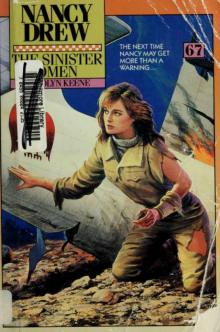 The Sinister Omen
The Sinister Omen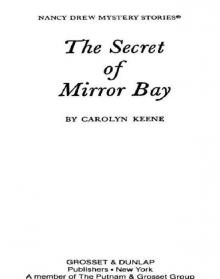 The Secret of Mirror Bay
The Secret of Mirror Bay Rendezvous in Rome
Rendezvous in Rome The Perfect Plot
The Perfect Plot The Mystery of Misty Canyon
The Mystery of Misty Canyon Nancy's Mysterious Letter
Nancy's Mysterious Letter The Snow Queen's Surprise
The Snow Queen's Surprise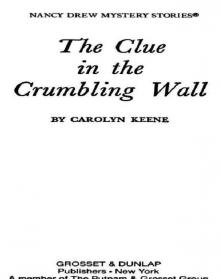 The Clue in the Crumbling Wall
The Clue in the Crumbling Wall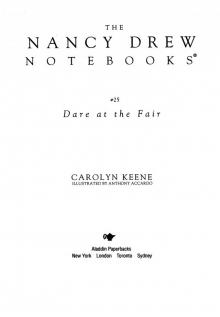 Dare at the Fair
Dare at the Fair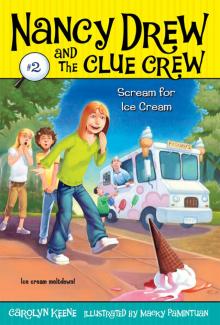 Scream for Ice Cream
Scream for Ice Cream A Star Witness
A Star Witness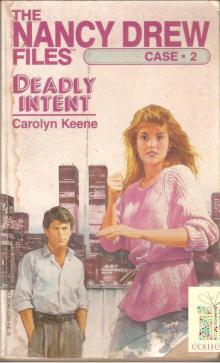 002 Deadly Intent
002 Deadly Intent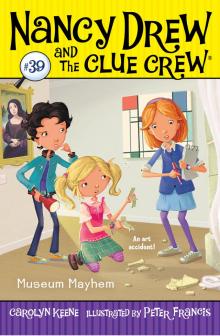 Museum Mayhem
Museum Mayhem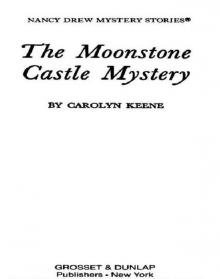 The Moonstone Castle Mystery
The Moonstone Castle Mystery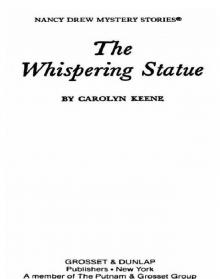 The Whispering Statue
The Whispering Statue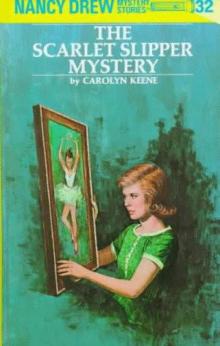 The Scarlet Slipper Mystery
The Scarlet Slipper Mystery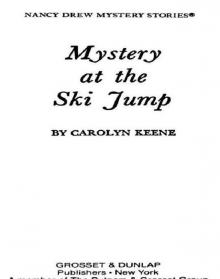 Mystery at the Ski Jump
Mystery at the Ski Jump Hot Pursuit
Hot Pursuit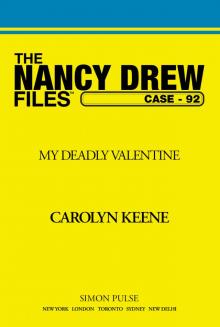 My Deadly Valentine
My Deadly Valentine The Silent Suspect
The Silent Suspect Deep Secrets
Deep Secrets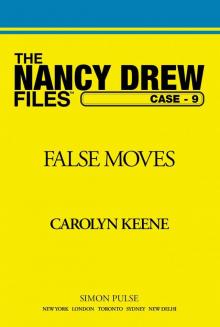 False Moves
False Moves The Zoo Crew
The Zoo Crew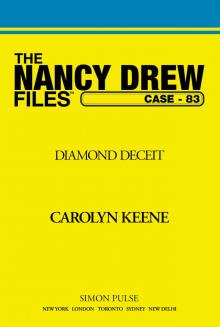 Diamond Deceit
Diamond Deceit The Sky Phantom
The Sky Phantom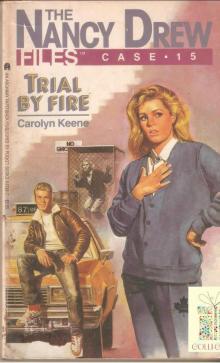 015 Trial by Fire
015 Trial by Fire The Quest of the Missing Map
The Quest of the Missing Map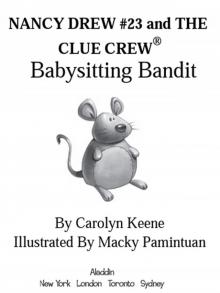 Babysitting Bandit
Babysitting Bandit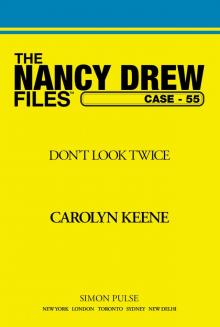 Don't Look Twice
Don't Look Twice Never Say Die
Never Say Die The Soccer Shoe Clue
The Soccer Shoe Clue Pool Party Puzzler
Pool Party Puzzler The Case of the Lost Song
The Case of the Lost Song The Apple Bandit
The Apple Bandit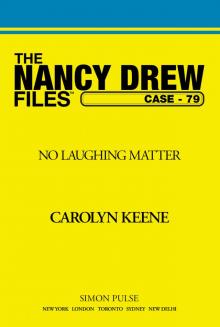 No Laughing Matter
No Laughing Matter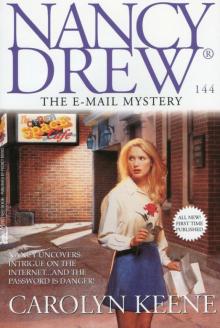 The Thirteenth Pearl
The Thirteenth Pearl Sabotage at Willow Woods
Sabotage at Willow Woods Butterfly Blues
Butterfly Blues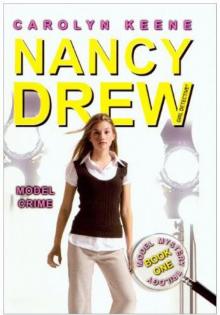 Model Crime 1
Model Crime 1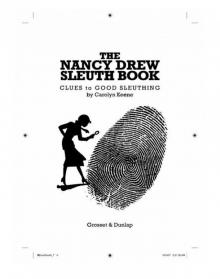 The Nancy Drew Sleuth Book
The Nancy Drew Sleuth Book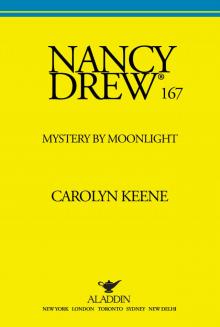 Mystery by Moonlight
Mystery by Moonlight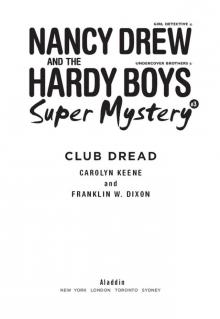 Club Dread
Club Dread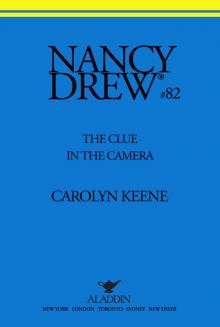 The Clue in the Camera
The Clue in the Camera 118 Betrayed By Love
118 Betrayed By Love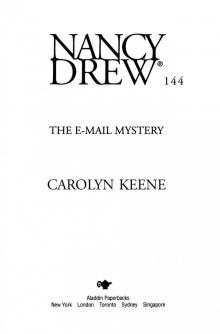 The E-Mail Mystery (Nancy Drew Book 144)
The E-Mail Mystery (Nancy Drew Book 144)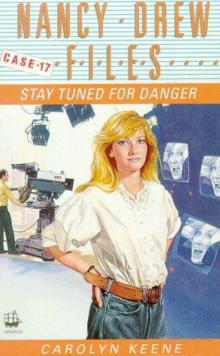 Stay Tuned for Danger: Circle of Evil
Stay Tuned for Danger: Circle of Evil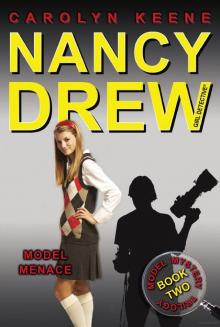 Model Menace 2
Model Menace 2 California Schemin': Book One in the Malibu Mayhem Trilogy
California Schemin': Book One in the Malibu Mayhem Trilogy Zoo Clue (Nancy Drew Notebooks)
Zoo Clue (Nancy Drew Notebooks)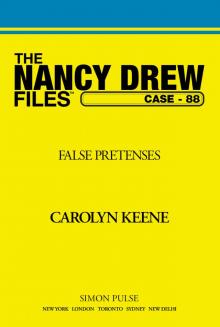 False Pretences
False Pretences 151 The Chocolate-Covered Contest
151 The Chocolate-Covered Contest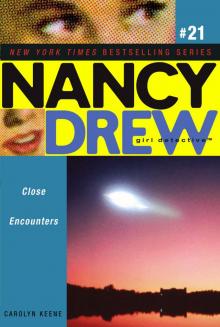 Close Encounters
Close Encounters The Emeral-Eyed Cat Mystery
The Emeral-Eyed Cat Mystery Boo Crew
Boo Crew The Message in the Haunted Mansion (Nancy Drew Book 122)
The Message in the Haunted Mansion (Nancy Drew Book 122) A Nancy Drew Christmas
A Nancy Drew Christmas 149 The Clue Of The Gold Doubloons
149 The Clue Of The Gold Doubloons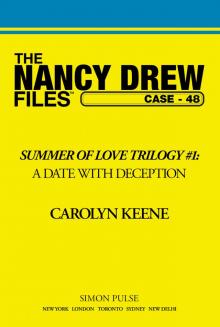 A Date with Deception
A Date with Deception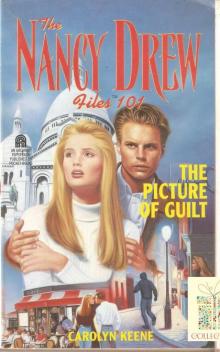 101 The Picture of Guilt
101 The Picture of Guilt The Secret in the Spooky Woods (Nancy Drew Notebooks Book 62)
The Secret in the Spooky Woods (Nancy Drew Notebooks Book 62)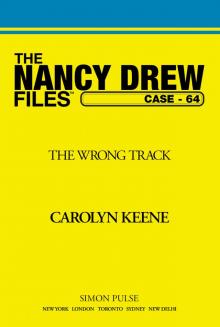 The Wrong Track
The Wrong Track Lights! Camera! Clues!
Lights! Camera! Clues!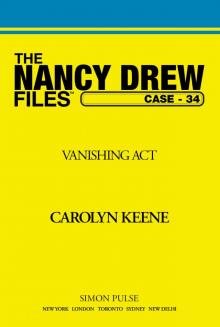 The Vanishing Act
The Vanishing Act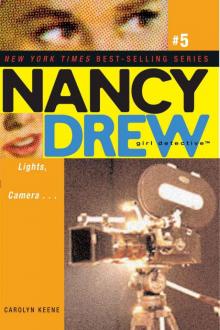 Lights, Camera . . .
Lights, Camera . . . Model Suspect 3
Model Suspect 3 160 The Clue On The Crystal Dove
160 The Clue On The Crystal Dove 163 The Clues Challenge
163 The Clues Challenge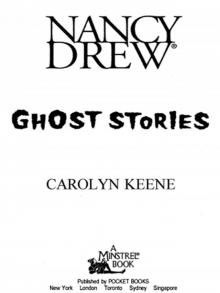 Ghost Stories (Nancy Drew)
Ghost Stories (Nancy Drew) Space Case (Nancy Drew Notebooks Book 61)
Space Case (Nancy Drew Notebooks Book 61)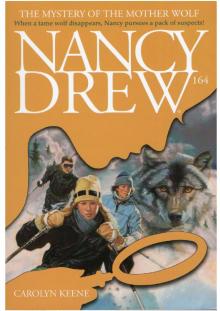 164 The Mystery Of The Mother Wolf
164 The Mystery Of The Mother Wolf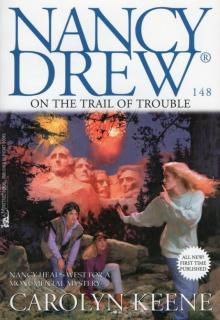 148 On The Trail Of Trouble
148 On The Trail Of Trouble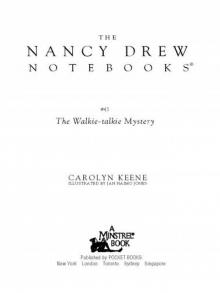 The Walkie-Talkie Mystery
The Walkie-Talkie Mystery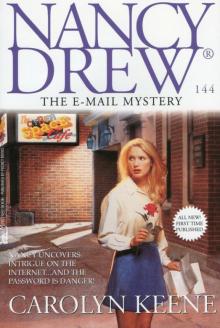 The E-Mail Mystery
The E-Mail Mystery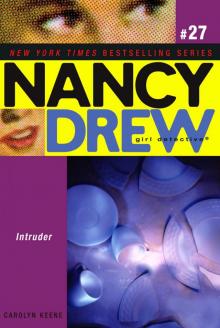 Intruder (Nancy Drew (All New) Girl Detective)
Intruder (Nancy Drew (All New) Girl Detective)![The Stolen Relic [Nancy Drew Girl Detective 007] Read online](http://i1.bookreadfree.com/i2/04/11/the_stolen_relic_nancy_drew_girl_detective_007_preview.jpg) The Stolen Relic [Nancy Drew Girl Detective 007]
The Stolen Relic [Nancy Drew Girl Detective 007] 105 Stolen Affections
105 Stolen Affections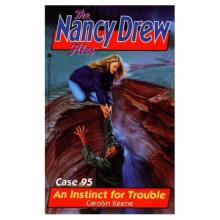 An Instict for Trouble
An Instict for Trouble 161 Lost In The Everglades
161 Lost In The Everglades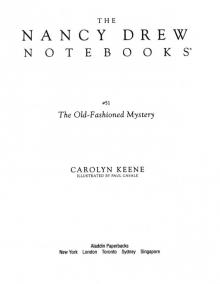 The Old-Fashioned Mystery
The Old-Fashioned Mystery Perfect Plot
Perfect Plot